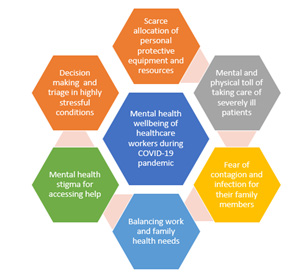Mini Review 
 Creative Commons, CC-BY
Creative Commons, CC-BY
Who will Heal the Healers?
*Corresponding author: Farwa Rizvi, PhD candidate, Faculty of Health, School of Health and Social Development, Deakin University, 221 Burwood Highway, Burwood 3125, VIC, Australia.
Received: June 26, 2020; Published: June 29, 2020
DOI: 10.34297/AJBSR.2020.09.001388
Introduction
COVID-19 pandemic has changed life as we know it. The world has been witnessing an unprecedented COVID-19 pandemic wreaking havoc for the past few months. This viral pandemic has caused fear and massive concern globally and has affected the mental health of not only the general public [1], but also the healthcare workers. Healthcare personnel including doctors, nurses and paramedical staff working in the front lines are amongst the most vulnerable. These healthcare workers are the unsung heroes fighting this war in the front lines against COVID-19 pandemic. Unfortunately, they are also the most vulnerable for the mental and physical onslaught brought on by the pandemic. In Wuhan and other regions in China, the healthcare workers caring for COVID-19 patients have reported higher levels of depression, anxiety, insomnia and distress [2].
Healthcare workers constantly fear contagion and infection transmission to their family members and friends [2,3]. At present there is a focus on keeping the emergency departments clear of patients other than trauma and potential COVID-19 patients. The tragedy of patients dying alone is not only heartbreaking for the family members but also for the healthcare workers involved. Shortages of personal protective equipment for healthcare workers and ventilators is a very valid concern adding to the stress level [4].
It is understandable that the mental health issues and wellbeing of the healthcare workers will take a backseat at present. Many retired healthcare workers have answered the call for help around the world. None have ever experienced dealing with a dilemma of this magnitude. The general public is doing their best to lift their morale. People in various cities around the world are standing on balconies and leaning out of windows to clap and cheer the healthcare workers. They are also donating supplies to hospitals. There are companies offering free products and services to healthcare workers.
We need to be cognizant of the mental health challenges brought on by the onslaught of the COVID-19 pandemic to our communities. This includes the healthcare workers who already have a higher burnout and depression rate with only a few receiving the required treatment [5]. The adapted (Figure 1) shows some pertinent factors negatively affecting the mental health of the healthcare workers [6]. There is a need for sustained mental health support programs for the healthcare workers. This is pertinent not only to take care of their acute mental health issues, but also to minimise the impact of post-traumatic stress disorders (PTSD). There is a need for formulating a robust policy specifically designed to endorse regular, quick mental health checks as a part of an ongoing mental health support program in various individual institutions across states and countries. Moving forward, there is a need for evidence-based action plans including sustained mental health support and active monitoring of the healthcare workers not only during crisis but also in the aftermath.
References
- Xiang Y-T, Yang Y, Li W, Zhang L, Zhang Q, et al. (2020) Timely mental health care for the 2019 novel coronavirus outbreak is urgently needed. The Lancet Psychiatry 7(3): 228-229.
- Lai J, Ma S, Wang Y, Cai Z, Hu J, et al. (2020) Factors Associated with Mental Health Outcomes Among Health Care Workers Exposed to Coronavirus Disease 2019. JAMA Network Open 3(3): e203976.
- Aoyagi Y, Beck CR, Dingwall R, Nguyen Van Tam JS (2015) Healthcare workers' willingness to work during an influenza pandemic: a systematic review and meta‐analysis. Influenza Other Respi Viruses 9(3): 120-130.
- Kincaid E (2020) COVID-19 Daily: Physician Gag Orders, 'Coronavirus Party'. Medscape.
- Pospos S, Young IT, Downs N, Iglewicz A, Depp C, et al. (2018) Web-based tools and mobile applications to mitigate burnout, depression, and suicidality among healthcare students and professionals: a systematic review. Acad Psychiatry 42(1): 109-120.
- Greenberg N, Docherty M, Gnanapragasam S, Wessely S (2020) Managing mental health challenges faced by healthcare workers during covid-19 pandemic. BMJ pp. 368.




 We use cookies to ensure you get the best experience on our website.
We use cookies to ensure you get the best experience on our website.